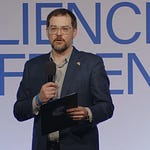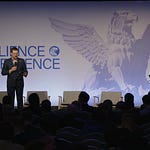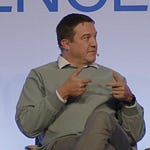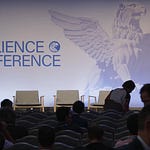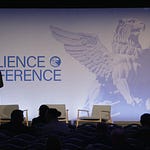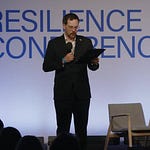When we sat down with Dr. Daniel Carew, the Canadian general partner at Archangel, the conversation started with a joke about not being the kind of doctor who could help out in an emergency. He has a PhD in Nanochemistry.
“This is why it's not on my passport, so when they call for a doctor on a plane, they don't ask for me,” he said.
But the conversation quickly turned serious. Carew has spent his life circling defence—trained as an engineer, almost a military officer, then a PhD, consultant, and finally a venture capitalist. And through it all, the focus has been the same: building up tools that help with strategic defence.
“I was always planning to be a military engineer,” he said. “That was my dream from the very beginning. Then I won a full scholarship to the University of Toronto and decided not to do that.From the age I could read, I've been reading about DARPA because DARPA had all the coolest stuff.”
Now he has doubled-down on the future of defence in Europe simply because of the grave need.
Carew pointed out something blunt: for thirty years we’ve lived in a peace dividend. Post-Cold War, the U.S. sat atop the world, and Europe treated defence like a dirty word. Money flowed into consumer tech and platforms. That era is over. We’re back in what NATO officials now call “pre-war”—a multipolar world where states are less polite and competition is sharp.
For Carew, that means defence is no longer niche. It is the foundation. Nations that control supply chains, space data, drone technology, and industrial production will set the terms of global trade and power. Europe, he argues, must learn the lesson the U.S. and China already know: defence is the on-ramp for technology and any country not focused on defence is a country that will end up defenceless.
“I'm using defence sort of loosely here, right?” he said. “It's really investing in competition between nations. Nations are becoming much less polite in terms of how they compete with one another. And I think, unfortunately, that is the truth from now on.”
Europe’s problem, Carew says, isn’t laziness. It’s chaos. Capability, willingness, and messaging, the three pillars of deterrence, are scattered across member states. Billions flow to Ukraine, but the effort looks uncoordinated. The result is uncertainty, both for adversaries and allies.
Archangel’s answer is to invest “defence first.” No hedging, no dual-use euphemisms. If technology is hardened in defence, it will eventually filter into civilian life. DARPA proved that with everything from UAVs to Moderna’s vaccine. But if you start consumer-first, you rarely make it back into defence. Europe needs to flip the funnel.
Archangel is already placing bets. High-speed boats for Baltic special forces. Reconnaissance platforms. Long-range strike capabilities. Communications systems designed for the next cycle, and the cycle after that. Carew thinks in decades, not quarters, and he wants startups that are willing to grow in that mold. Two PhDs in a garage are welcome, so long as they’re solving real problems articulated by militaries and strategists.
Carew’s message is clear: sovereignty is deterrence, defence is the forge, and Europe needs to relearn this fast. The positive spin, if there is one, is that building this capacity also builds jobs, industries, and unicorns. Defence-first can be an engine for growth, not just a cost.




